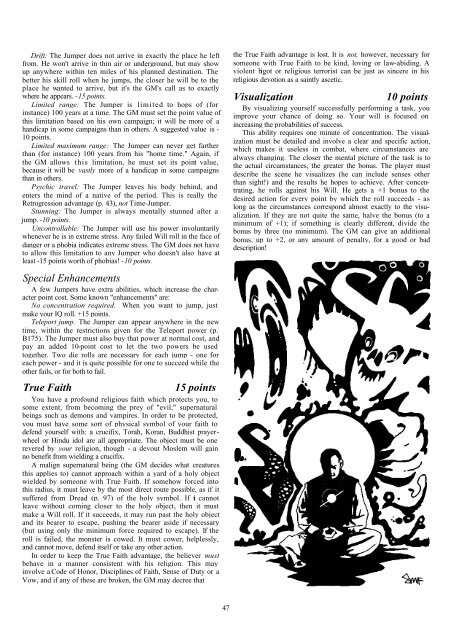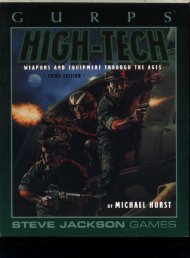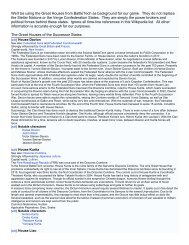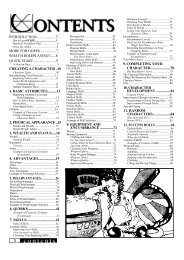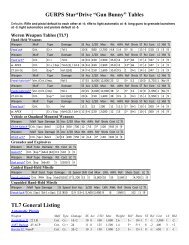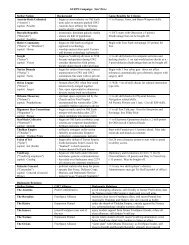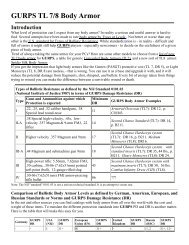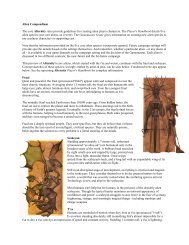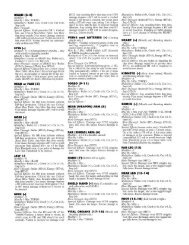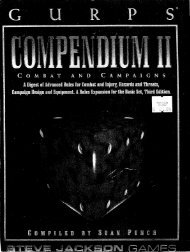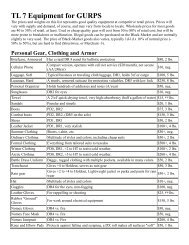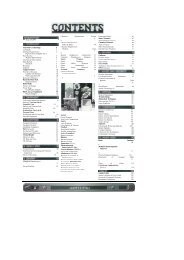GURPS - Compendium 1..
GURPS - Compendium 1..
GURPS - Compendium 1..
Create successful ePaper yourself
Turn your PDF publications into a flip-book with our unique Google optimized e-Paper software.
Drift: The Jumper does not arrive in exactly the place he left<br />
from. He won't arrive in thin air or underground, but may show<br />
up anywhere within ten miles of his planned destination. The<br />
better his skill roll when he jumps, the closer he will be to the<br />
place he wanted to arrive, but it's the GM's call as to exactly<br />
where he appears. -15 points.<br />
Limited range: The Jumper is limited to hops of (for<br />
instance) 100 years at a time. The GM must set the point value of<br />
this limitation based on his own campaign; it will be more of a<br />
handicap in some campaigns than in others. A suggested value is -<br />
10 points.<br />
Limited maximum range: The Jumper can never get farther<br />
than (for instance) 100 years from his "home time." Again, if<br />
the GM allows this limitation, he must set its point value,<br />
because it will be vastly more of a handicap in some campaigns<br />
than in others.<br />
Psychic travel: The Jumper leaves his body behind, and<br />
enters the mind of a native of the period. This is really the<br />
Retrogression advantage (p. 43), not Time-Jumper.<br />
Stunning: The Jumper is always mentally stunned after a<br />
jump. -10 points.<br />
Uncontrollable: The Jumper will use his power involuntarily<br />
whenever he is in extreme stress. Any failed Will roll in the face of<br />
danger or a phobia indicates extreme stress. The GM does not have<br />
to allow this limitation to any Jumper who doesn't also have at<br />
least -15 points worth of phobias! -10 points.<br />
Special Enhancements<br />
A few Jumpers have extra abilities, which increase the character<br />
point cost. Some known "enhancements" are:<br />
No concentration required. When you want to jump, just<br />
make your IQ roll. +15 points.<br />
Teleport jump. The Jumper can appear anywhere in the new<br />
time, within the restrictions given for the Teleport power (p.<br />
B175). The Jumper must also buy that power at normal cost, and<br />
pay an added 10-point cost to let the two powers be used<br />
together. Two die rolls are necessary for each jump - one for<br />
each power - and it is quite possible for one to succeed while the<br />
other fails, or for both to fail.<br />
True Faith<br />
15 points<br />
You have a profound religious faith which protects you, to<br />
some extent, from becoming the prey of "evil," supernatural<br />
beings such as demons and vampires. In order to be protected,<br />
you must have some sort of physical symbol of your faith to<br />
defend yourself with: a crucifix, Torah, Koran, Buddhist prayerwheel<br />
or Hindu idol are all appropriate. The object must be one<br />
revered by your religion, though - a devout Moslem will gain<br />
no benefit from wielding a crucifix.<br />
A malign supernatural being (the GM decides what creatures<br />
this applies to) cannot approach within a yard of a holy object<br />
wielded by someone with True Faith. If somehow forced into<br />
this radius, it must leave by the most direct route possible, as if it<br />
suffered from Dread (p. 97) of the holy symbol. If it cannot<br />
leave without coming closer to the holy object, then it must<br />
make a Will roll. If it succeeds, it may run past the holy object<br />
and its bearer to escape, pushing the bearer aside if necessary<br />
(but using only the minimum force required to escape). If the<br />
roll is failed, the monster is cowed. It must cower, helplessly,<br />
and cannot move, defend itself or take any other action.<br />
In order to keep the True Faith advantage, the believer must<br />
behave in a manner consistent with his religion. This may<br />
involve a Code of Honor, Disciplines of Faith, Sense of Duty or a<br />
Vow, and if any of these are broken, the GM may decree that<br />
the True Faith advantage is lost. It is not, however, necessary for<br />
someone with True Faith to be kind, loving or law-abiding. A<br />
violent bigot or religious terrorist can be just as sincere in his<br />
religious devotion as a saintly ascetic.<br />
Visualization<br />
10 points<br />
By visualizing yourself successfully performing a task, you<br />
improve your chance of doing so. Your will is focused on<br />
increasing the probabilities of success.<br />
This ability requires one minute of concentration. The visualization<br />
must be detailed and involve a clear and specific action,<br />
which makes it useless in combat, where circumstances are<br />
always changing. The closer the mental picture of the task is to<br />
the actual circumstances, the greater the bonus. The player must<br />
describe the scene he visualizes (he can include senses other<br />
than sight!) and the results he hopes to achieve. After concentrating,<br />
he rolls against his Will. He gets a +1 bonus to the<br />
desired action for every point by which the roll succeeds - as<br />
long as the circumstances correspond almost exactly to the visualization.<br />
If they are not quite the same, halve the bonus (to a<br />
minimum of +1); if something is clearly different, divide the<br />
bonus by three (no minimum). The GM can give an additional<br />
bonus, up to +2, or any amount of penalty, for a good or bad<br />
description!<br />
47


